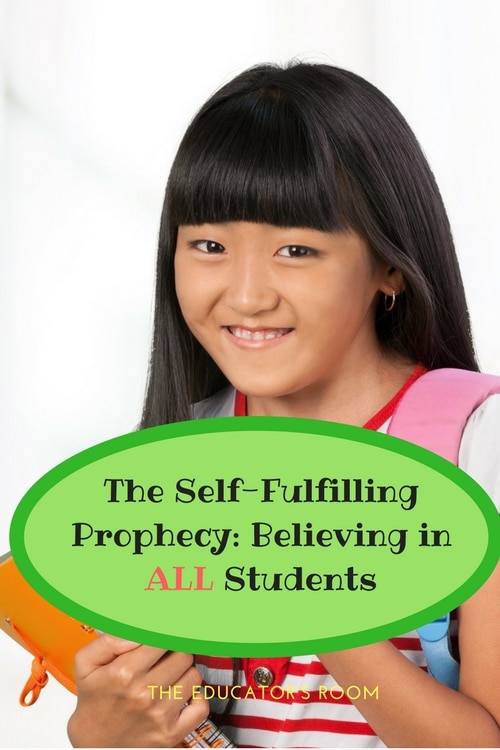Tell me if these statements sound familiar to you: “Johnny will never understand how to divide with fractions.” “Andre scored a Level 1 on his test last year…we really need to focus on the students we can move to proficiency.” “Victoria doesn’t even know how to write a sentence. There’s no way she’ll ever write a paragraph.”
If these sound familiar, you are probably used to hearing defeatist attitudes in education. Sometimes, I tell my students that whether they believe they can or they can’t, they’re right. It’s called a self-fulfilling prophecy. So, if we go into our classrooms with preconceived notions of what our students can (or can’t) do, we’ll more than likely fulfill that prophecy.
Why is it important to beware of the self-fulfilling prophecy?
As an educator, you influence your students more than most people in their lives. If you do not believe in your students and they don’t believe in themselves, you have now doubled the impact of learned helplessness. Children are smart and they know when we’re sincere and when we’re not. Think about how much enthusiasm you feel when talking to someone you really hit it off with and then compare that to how much enthusiasm you feel when talking to someone you have to work with but don’t really like. With the first person, you can compliment them, provide them with meaningful feedback, and even enjoy small talk with. With the second person, you can compliment them, but you will lack enthusiasm and force a pasted-on smile, and you get away as quickly as possible. Take that situation and apply it to your classroom.
[fusion_builder_container hundred_percent=”yes” overflow=”visible”][fusion_builder_row][fusion_builder_column type=”1_1″ background_position=”left top” background_color=”” border_size=”” border_color=”” border_style=”solid” spacing=”yes” background_image=”” background_repeat=”no-repeat” padding=”” margin_top=”0px” margin_bottom=”0px” class=”” id=”” animation_type=”” animation_speed=”0.3″ animation_direction=”left” hide_on_mobile=”no” center_content=”no” min_height=”none”][bctt tweet=”If you do not believe in your students and they don’t believe in themselves, you have now doubled the impact of learned helplessness.” username=”EducatorsRoom”]
Do you have students you believe will boost your test scores and others that you feel just take up space in your classroom? Well, guess what? Those space-fillers are actual people with real feelings. At some point, someone stopped believing in them. Or maybe, even worse, no one has ever believed in that student. So here he sits, in your classroom, knowing he’s going to fail. You don’t call on him. You don’t talk to him unless you have to, and it’s usually to criticize him, and you expect the blank spaces on his paper. How much time do you spend on this student? Do you think he recognizes that you’ve already given up on him? Oh, he knows. And as you both decide his fate before even really trying, you have created your very own self-fulfilling prophecy. Failure. Suddenly, it has become an option.
We Must Believe in Them ALL
All children deserve the chance to start over each year. Too often, we comb through cumulative records, take note of all the failures of some students, the successes of others, and disciplinary referrals, and we make pre-judgments about them. We rank them. We decide who will make it and who won’t, all before meeting them. I refuse to buy into the “he’ll never pass” mentality. I don’t care if my student was in the 1st percentile on last year’s end-of-grade test. Every student has potential, if only we help them find it. Only about 5% of our students should need more intervention than we can provide in the classroom and those are our special education students. But guess what? I’ve had special education students who have passed the full state version of the end-of-grade test. I believed in that student, so that student believed in himself for the first time in years. It can happen. With good strategies, caring hearts, a healthy amount of effort, and belief in abilities, all students can find some measure of success.
This year, I plan to put a banner up in my classroom that says “Failure is not an option,” and it’s not because I care about the end-of-grade test, but because no student should fail in my class. I define failure as a lack of ability to grow, and I don’t believe any of my students lack the potential for growth. I expect excellence, effort, and excitement. And since I believe it, we can achieve it.
Beware the self-fulfilling prophecy. Or at least make it a good one.
Believe.
Achieve.
Rock on.[/fusion_builder_column][/fusion_builder_row][/fusion_builder_container]




